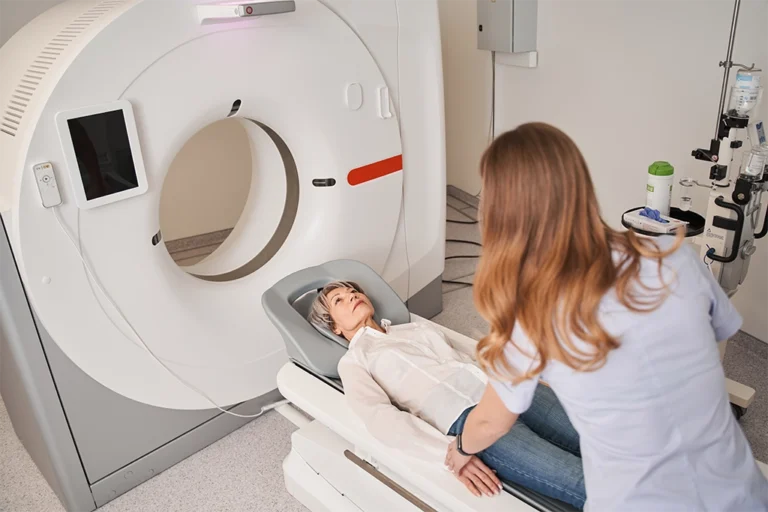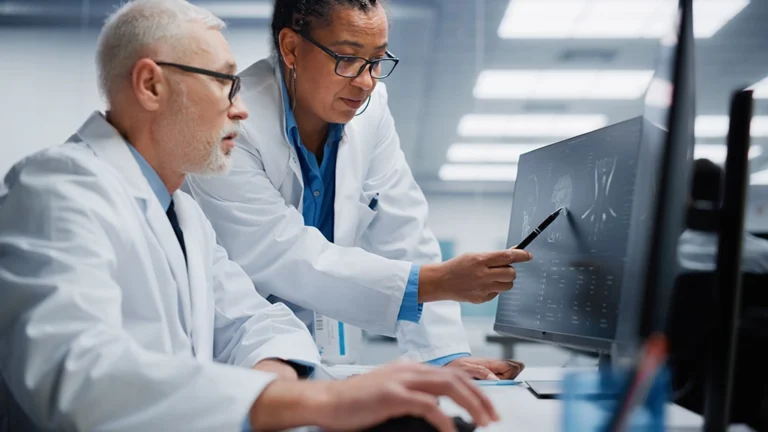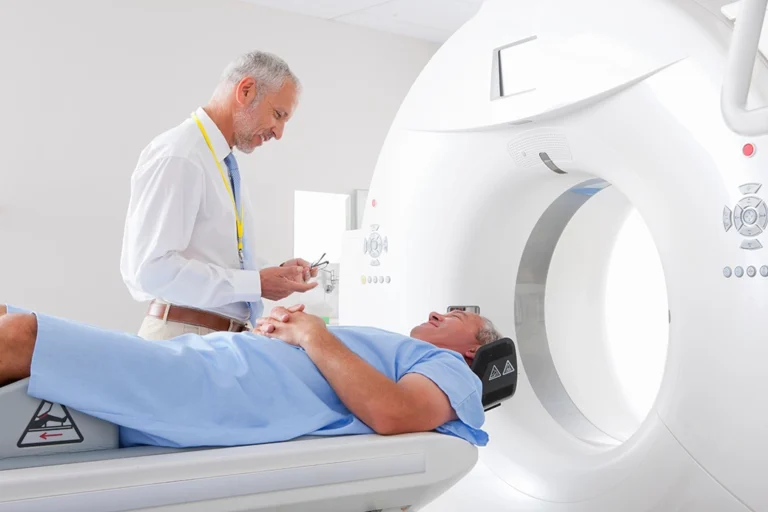CT scans use a small amount of radiation to make your results more accurate, so that your healthcare provider can more clearly see inside your body, ensuring that they can more precisely diagnose your condition. But it’s understandable if radiation seems a little intimidating.
When your doctor has recommended a CT scan, trust that the benefits of getting the scan outweighs any of the negatives that may come with it. The amount of radiation you are exposed to during a CT scan is very small.
It’s important to remember that we are exposed to small amounts of background radiation every day. Very common things like televisions, cellphones, granite counters, smoke detectors, and even bananas emit a little bit of radiation.
We’ll show you how CT scans use radiation to create accurate images, how to reduce radiation before your scan, and how to protect your body from radiation during a CT scan. Let’s take a closer look at CT scans and radiation.
Understanding how CT scans use radiation
Radiation seems a little intimidating, but when it’s used to help diagnose something that’s impacting your health, you can see that radiation can be a powerful tool for your healthcare team. Let’s start by looking at why CT scans are safe for most people, why CT machines use radiation to help your provider to make a diagnosis, and how your provider determines if you’re a good candidate to get a CT scan.
Is it safe for most people to get a CT scan?
Yes, for most people, getting a CT scan is safe. CT scans use a controlled dose of radiation to create detailed images of the inside of your body. Your healthcare provider will carefully evaluate whether the benefits of a CT scan outweigh any potential risks.
The amount of radiation exposure from a single CT scan is relatively low, and while repeated exposure over time can be a concern, healthcare providers take precautions to minimize unnecessary scans. Most CT scans expose you to a radiation dose that is within safe limits for medical imaging.
To put this into perspective, the radiation from a typical CT scan is often comparable to the natural background radiation you are exposed to over the course of a year. That said, providers take factors like your age, medical history, and the urgency of the scan into account before recommending it, ensuring that CT scans are only used when necessary.
Why do CT scans use radiation? How does a CT scan help my healthcare provider to make a diagnosis?
CT scans use radiation because it allows the machine to capture incredibly detailed images of structures inside your body. The scan works by sending a series of carefully measured radiation beams through your body, which are then detected and processed by a computer to create cross-sectional images.
These images provide far more detail than a standard medical image, allowing your healthcare team to see bones, organs, blood vessels, and soft tissues very clearly. This level of detail is critical for diagnosing a wide range of conditions, including injuries, infections, growths, internal bleeding, and others.
A CT scan can reveal things that might not be visible with other types of imaging, making it an essential tool when a provider needs precise information. Because it gives such a clear view of what’s happening inside your body, a CT scan can often speed up diagnosis and treatment decisions, reducing uncertainty and helping you get the care you need.
How do providers determine when a CT scan is necessary for making a diagnosis?
Healthcare providers do not recommend CT scans without careful consideration. They weigh several factors, including your symptoms, medical history, and the urgency of the situation, before deciding whether a CT scan is the best option.
If a provider has recommended a CT scan for you, it’s likely because the benefits of getting a clear and accurate diagnosis outweigh the small amount of radiation exposure involved. In many cases, they will consider alternative types of imaging or diagnostic tests first, only recommending a CT scan when it is the most effective way to get the information they need.
Providers also follow established medical guidelines that help them determine when a CT scan is truly necessary. These guidelines are based on research and best practices, to ensure that patients receive the most appropriate diagnostic tests, while also minimizing any unnecessary radiation exposure.
View our available CT appointments at a location near you today
Reducing radiation exposure before your CT scan
There are a lot of things you can do to help limit your exposure to radiation during a CT scan, depending on the kind of CT scan you’re getting, as well as your medical history. To help you discuss radiation with your provider, we’ve included some questions you can ask, so you can fully understand the CT scan that your provider recommends.
How does the type of CT scan influence the amount of radiation exposure?
Not all CT scans use the same amount of radiation, and the type of scan you are getting plays a big role in determining your exposure. Different parts of the body require different levels of detail, and some scans use higher doses of radiation to capture clearer images.
Newer CT scanning technology allows for lower doses of radiation while still producing high-quality images. Many imaging centers use advanced techniques to adjust the radiation dose based on your body size, the area being scanned, and the reason for the test. If you are concerned about radiation exposure, you can ask your provider more about your specific scan.
How can sharing my medical history with my healthcare team help me stay safe from radiation?
Providing a complete medical history helps your healthcare team determine whether a CT scan is truly necessary and if any adjustments should be made to minimize radiation exposure. If you have had previous imaging tests, including past CT scans, sharing that information can help your provider decide whether a different type of test might be a better option.
Your medical history also helps ensure that the CT scan is tailored to your specific needs. Factors such as pregnancy, underlying medical conditions, or sensitivity to radiation can influence the way your provider approaches the scan.
If you have concerns about radiation exposure, you should discuss them with your healthcare provider, who will be able to work with you to find the best available diagnostic scan for your care.
What are some questions I should ask my provider about radiation exposure and safety?
Asking questions about your CT scan can help you feel more confident about the procedure and ensure that your exposure to radiation is as low as possible. Here are some good questions to ask your doctor about radiation exposure from a CT scan:
- How will this scan help guide my treatment?
- What are the risks and benefits of this CT scan?
- Will this CT scan expose my body to a lot of radiation?
- How will this CT scan be customized to my body type and medical needs?
- Will I need a protective shield for my scan?
- Are there lower-dose CT scan options available?
Your provider will answer your questions, and guide you through every aspect of getting a CT scan. Having some questions to ask your provider will ensure that you are making the most informed decision about your health.
Protecting your body from radiation during your scan
During a CT scan, your technologist will do everything they can to ensure your safety, which includes limiting your exposure to radiation during your scan. We’ll show you how modern CT scans reduce your exposure, and what your CT technologist may do to ensure your radiation exposure is minimal, depending on the scan you’re getting.
How have advancements in CT technology reduced exposure to radiation?
Advancements in CT scan technology have significantly reduced the amount of radiation needed to produce high-quality images. Modern CT scanners use more precise settings that automatically adjust the radiation dose based on the area being scanned.
That means you’ll receive both the lowest necessary exposure and accurate CT images from your scan. CT machines also use improved image-processing software, which enhances scan quality without requiring higher radiation levels.
Many CT machines now have dose-reduction features, which can refine a CT image after it has been taken. Some imaging centers also offer CT machines with technology that helps keep the dose of radiation as low as possible.
How does my body’s position during a CT scan affect how much radiation I receive?
For a CT scan, a technologist will carefully position you to ensure that the scan captures the necessary images, while avoiding unnecessary exposure to other areas of your body.
Even small adjustments, like keeping your arms raised during certain scans, can help reduce the amount of radiation reaching sensitive tissues.
Keeping still helps to ensure that the scan is completed in a single attempt. If you move during your scan, it may blur the images, and you’ll need to repeat the scan, which could increase your radiation exposure.
What will my CT technologist do to make sure I receive the lowest necessary dose of radiation?
CT technologists are trained to minimize radiation exposure while still obtaining the best possible images for your diagnosis. Before your scan, they carefully adjust the scanner settings to match your body size and the specific area being examined, ensuring that the lowest possible radiation dose is used.
Your technologist will follow strict protocols to prevent unnecessary radiation exposure. They may limit the scan area to only the region needed for diagnosis, avoiding exposure to surrounding tissues.
Many CT scans can automatically adjust the radiation levels based on the density of the tissues being imaged. If you have concerns, you can ask your technologist about the steps they are taking to reduce your radiation dose.
How can using shielding during the scan help to protect parts of your body from unnecessary radiation?
For some CT scans, protective shielding is used to cover areas of the body that are not being scanned, helping to minimize unnecessary radiation exposure. Shields are typically made of lead or other radiation-absorbing materials, and are placed over sensitive areas like the thyroid, groin, or breasts.
Shielding is not necessary for every scan, as modern CT scans are designed to minimize exposure through precise targeting. Your technologist will determine whether shielding is beneficial for your specific scan.
For some CT scans, placing a shield too close to the scan area could interfere with image quality, which is why shielding is used with care. Your CT technologist will do everything they can to make sure that you aren’t exposed to too much radiation.
Reach out to us at any of the following locations to book an appointment:
- Haddonfield Office – Haddonfield, NJ
- Marlton (Greentree) Office – Marlton, NJ
- Medford Office – Medford, NJ
- Mount Laurel Office – Mount Laurel, NJ
- Moorestown Office – Moorestown, NJ
- Route 73 (Voorhees) Office – Voorhees Township, NJ
- Sewell (Washington Township) Office – Sewell, NJ
- Turnersville Office – Turnersville, NJ
- West Deptford Office – West Deptford, NJ
- Willingboro Office – Willingboro, NJ
Learn more about the board-certified, subspecialized radiologists who read, analyze and interpret the findings here at South Jersey Radiology Associates.
Frequently Asked Questions
Yes, CT scans are generally safe, as they use a controlled dose of radiation, and healthcare providers carefully assess the benefits before recommending one.
A CT scan provides highly detailed images of your body’s internal structures, allowing your doctor to diagnose conditions more accurately than standard imaging methods.
No, the amount of radiation varies depending on the type of scan, with newer technology and dose-reduction methods helping to minimize exposure.
Yes, providing your full medical history helps your doctor determine if a CT scan is necessary or if an alternative imaging method with lower radiation might be an option.
You can ask about the purpose of the scan, potential risks and benefits, dose-reduction options, and whether protective shielding will be used.
Modern CT scanners use advanced imaging techniques, dose adjustments, and improved software to reduce radiation while maintaining high-quality images.
Proper positioning helps limit radiation exposure to only the necessary areas and prevents the need for repeat scans due to blurred images.



